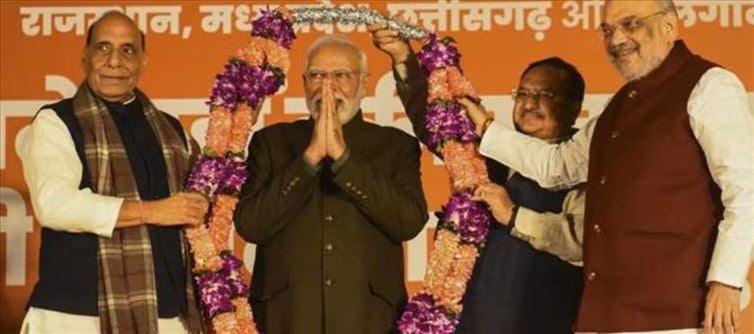
Still, while the results were never going to be a predictor of what would happen in 2024, especially if the bjp lost, the fact that the bjp swept the three states suggests the party has a significant edge moving into the national elections. The congress did win Telangana, and while this is a tremendous victory, it does not resolve the party's political issue, which is practically existential north of the Vindhyas.
Instead, the outcome demonstrates that narendra Modi's charm and mystical touch with people remains strong, particularly in the heartland. It demonstrates that the BJP's organization is still strong, and cadres are still motivated. It deprives the congress of both authority and resources that might have been useful during the lok sabha elections. And it underlines the reality that the BJP's story resonates with people, but the Congress' narrative, for all its ingenuity, does not. When each of these issues is considered independently, the contours of the 2024 conflict become evident.
The Modi Puzzle
And it matters because of the confidence Modi appears to offer voters. This is premised on a promise of relative integrity because the Opposition's campaign portraying Modi as a supporter of crony capitalists hasn't struck a chord beyond his opponents, just as the charges surrounding Rafale procurement in 2019 didn't. It is predicated on a promise of a "double engine" sarkar, in which supporters believe that having the bjp in power results in better government.
It is founded on a track record of welfare delivery in which Modi's image of caring for the poor resonates as a result of the government's cash transfers and 'ease of living' projects (gas cylinders, rural houses, free rationing, electricity, and drinking water). It is founded on an almost subliminal feeling of Hindu identity, a perception that Modi is best suited to preserve Hindu interests, and a yearning to be a part of something bigger than subcaste identities. And it is based on Modi's vision of raising India's status on the world scene.
The PM gave the party a distinct edge in the three states, and because voters did not appear to believe that the local options on offer were qualitatively superior, they appear to have opted to vote for the BJP. It also helped that there was no major looming issue -- agricultural and rural suffering were very serious issues in 2018. But, more crucially, all of these Modi-related variables will give the bjp an even stronger advantage in the lok sabha elections, where, as 2014 and 2019 have demonstrated, the leadership question is essential to voter choices. Modi's connection extends beyond politics; it is deeply emotional, and it is the BJP's enduring strength a decade after it initially carried him to office.




 click and follow Indiaherald WhatsApp channel
click and follow Indiaherald WhatsApp channel